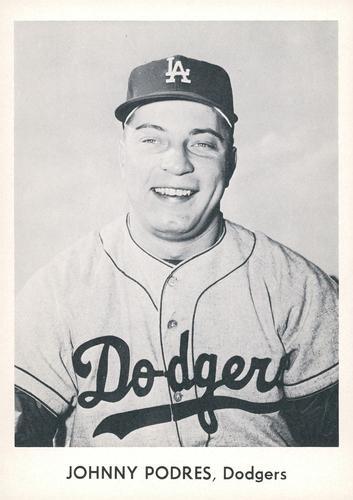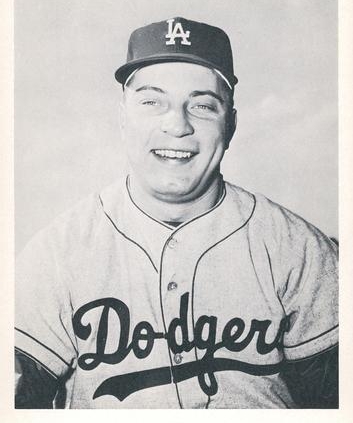May 25, 1959: Dodgers’ Johnny Podres blanks Giants 8-0 with two-hitter
 Nothing gives a Dodgers fan more joy than defeating the Giants. And vice versa.
Nothing gives a Dodgers fan more joy than defeating the Giants. And vice versa.
Courtesy of Johnny Podres’ left arm, Los Angeles’ 8-0 victory over its archrivals on May 25, 1959, was about as close to paradise as one gets in Dodger Nation.
Podres did not allow a hit until the eighth inning, finishing the game with a two-hitter on the Giants’ home turf. Invading enemy territory and emerging with a decisive victory intensified the elation.
Mike McCormick started on the Seals Stadium hill for the Giants and stemmed the Southern California squad for the first couple of innings with two strikeouts, one walk, and no hits.
Los Angeles had a two-out rally in the top of the third, thereby ending the submission to the home team.
Jim Gilliam singled off the San Francisco southpaw and scored when Charlie Neal doubled; Don Demeter’s single scored Neal. When left fielder Jackie Brandt tried to nab Neal at the plate, Demeter grabbed the opportunity to advance to second base.
Gil Hodges capped the barrage with a two-run homer to give the visitors a 4-0 lead. McCormick got the elusive third out when Rip Repulski hit a fly ball to Felipe Alou in right field.
Dodgers third baseman Dick Gray recorded his first hit of the game in the top of the fourth – a single that led off the inning – and reached second base when Joe Pignatano laid down a sacrifice bunt fielded by McCormick.
But anxiety soon lessened for Giants fans. Bob Lillis hit a fly ball to left fielder Brandt and Podres smacked a grounder to Orlando Cepeda at first base for a putout.
Any peace didn’t last long.
With two outs in the top of the fifth, Hodges cracked another two-run homer to give Podres a 6-0 cushion. After Repulski walked, McCormick got his exit visa.
Giants manager Bill Rigney pulled Al Worthington from the bullpen to tame the Dodgers. And the right-handed reliever did just that by getting Repulski out on Dick Gray’s grounder to Lillis at shortstop for the force out.
Joe Shipley took over San Francisco’s pitching in the top of the seventh. It was not an auspicious beginning for the right-hander. Neal walked; Demeter struck out looking, but Neal stole two bases in a row to set up the Dodgers with a runner on third and one out.
Hodges’ walk put two runners on base. But Shipley retired the next two batters. Like Demeter, Repulski and Gray whiffed looking.
Shipley began the top of the eighth by walking Pignatano. The pitcher’s throwing error on a pickoff attempt gave the runner a green light to speed to third base; Lillis added a run to the already formidable lead when he banged a single to send Pignatano across home plate.
By this point, blanking the Giants in hits seemed viable to southpaw Podres, enjoying a 7-0 lead, and the 9,173 fans in the stands.
Podres began the bottom of the eighth by fielding Brandt’s bunt for the first out. But Daryl Spencer punctured the Dodgers’ hope for a no-hitter. The Giants second baseman singled, then Bob Schmidt banged another base hit off Podres.
“I thought I might get the no-hitter when Brandt tried to bunt his way on and I got him,” Podres said. “And I thought the pitch Spencer hit, a low inside curve, was a good one.”1
It was surprising that Spencer was the one to wreck the no-hitter because he had knocked only three hits off Podres in his last 32 times facing the Dodger southpaw.2
Gray’s solo home run with two outs in the top of the ninth gave the Dodgers an 8-0 lead heading into the bottom of the inning.
Rigney tried to ignite the San Francisco lineup by pinch-hitting for Shipley. But the pinch-hitter, Roger McCardell, grounded to Lillis. Then Podres whiffed Alou and got André Rodgers on a fly out to Demeter in center.
Podres after the game suggested that his pitch selection played a key role in the mastery of the San Francisco nine. He said: “I’d been firing mostly fast balls earlier this season and getting tired. So I decided to use the change of pace a lot and it worked.”3
Weather was a highly significant factor for Podres as well. Associated Press sportswriter Jack Stevenson described the Memorial Day setting as a “windy, misty afternoon” and quoted Dodgers skipper Walter Alston in his reporting: “That type of weather works to the advantage of the batters, so [Podres’] work was even more noteworthy.”4
It was quite a feat, considering that San Francisco had two hitters who finished 1959 above .300 – Willie Mays and Cepeda.
Additionally, Podres’ control was evident throughout the game, which lasted 2 hours and 19 minutes. Only three Giants received walks: Cepeda in the second inning; Rodgers in the fourth inning; and Spencer in the fifth inning. There were seven strikeouts for the Dodgers lefty. Less than three weeks later, on June 11, he threw another two-hitter. His victory against the Phillies also took place on a road trip.
Los Angeles had accumulated nine hits and eight walks on the journey of domination. Hodges’ two-homer, four-RBI game may have tamped concerns for Dodgers fans, at least temporarily, about the impact of aging for the 35-year-old slugger.
In 1958 the Dodgers’ first season in Los Angeles, Hodges played in 141 games and ended the season with a .259 average, 22 home runs, and 64 RBIs. His numbers rose despite playing in fewer games in 1959 – in 124 games, Hodges hit .276 with 25 homers and 80 RBIs.
Hodges biographer Mort Zachter wrote: “Hodges was the kind of hitter that a great first baseman of a later generation, Keith Hernandez, would refer to as a “cripples hitter,” a player who could look foolish on a pitch one minute, but if the pitcher made a mistake and threw one in the hitter’s sweet spot, the hitter had the ability to drive the ball for an extra-base hit and cripple the pitcher.”5
LA raised its record to 22-20 with the victory. It was a tight NL so far – the Dodgers were tied for third place with the Pirates, 3½ games behind the league-leading Milwaukee Braves and a half-game behind the Giants.
The Braves and Dodgers tied at the end of the 1959 NL campaign, forcing a three-game playoff. Los Angeles took the first two games to win the pennant, then beat the White Sox in six games for the World Series title.
Podres went 14-9 in the regular season and notched a World Series victory in Game Two.
Sources
https://www.baseball-reference.com/boxes/SFN/SFN195905250.shtml
https://www.retrosheet.org/boxesetc/1959/B05250SFN1959.htm
Notes
1 Walter Judge, “Podres’ No-Hitter Ends in 8th; S.F. Blanked, 8-0,” San Francisco Examiner, May 26, 1959: Sec. II, 7.
2 Walter Judge, “Podres’ No-Hitter Ends in 8th.” Baseball-Reference shows Spencer’s stat as three hits in his last 33 times.
3 Jack Stevenson (Associated Press), “Johnny Podres Credits Increased Use of Change-Up Heave With New Success,” Chico (California) Enterprise-Record: 15.
4 Jack Stevenson, “Johnny Podres Credits Increased Use of Change-Up Heave With New Success.”
5 Mort Zachter, Gil Hodges: A Hall of Fame Life (Lincoln: University of Nebraska Press, 2015), 205.
Additional Stats
Los Angeles Dodgers 8
San Francisco Giants 0
Seals Stadium
San Francisco, CA
Box Score + PBP:
Corrections? Additions?
If you can help us improve this game story, contact us.


